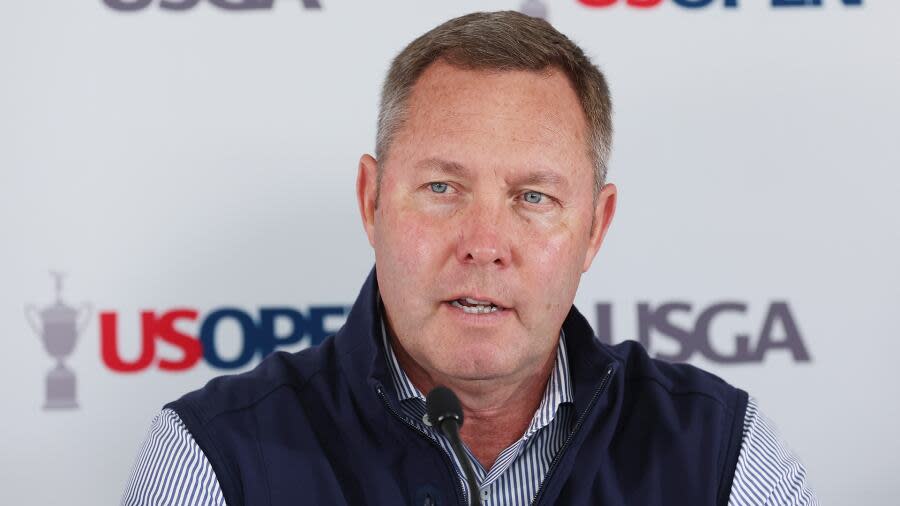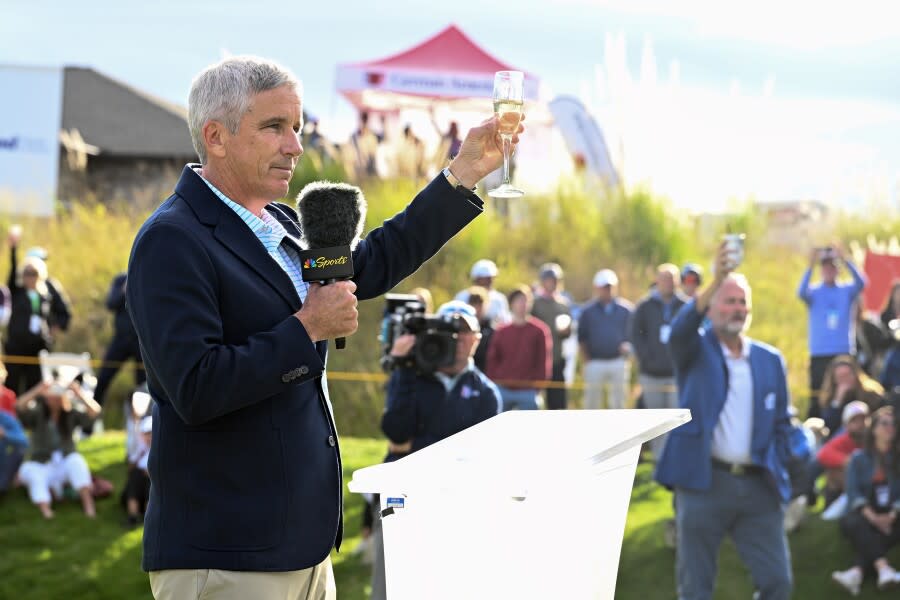Cut Line: After '23, here's to hoping for less divisive '24

In this year-ending edition of Cut Line, we celebrate 2023’s top performers, question the timing of the golf ball rollback and hope for less division in 2024:
Made Cut
Performance. Before we turn the page on what was the most eventful and contentious year in the modern professional game, let’s not forget the season’s best performances.
Jon Rahm leads the list with four victories, including the Masters for his second major, and top-10 finishes in half (10) of his PGA Tour starts. Those looking to nitpick will point out the Spaniard’s winless run after the Masters, but that ignores his spirited runner-up finish at The Open, three consecutive top-10 finishes to end the year on the DP World Tour and an undefeated record at the Ryder Cup (2-0-2).
Scottie Scheffler was nearly as prolific with two victories, including The Players, and a historic strokes gained: tee-to-green mark (2.61) that was second only to Tiger Woods’ record-setting season in 2006.
Viktor Hovland was the game’s most consistent player to finish the year with victories in June (Memorial) and August (BMW Championship and Tour Championship) along with a man-of-the-match performance at the Ryder Cup (3-1-1).
Given the frenzied state of the news cycle in golf, it’s easy to forget that there were headlines that were made on the course in ’23.
t-E-a-m. Luke Donald didn’t put the 'E' (Europe) in t-E-a-m, but he certainly embraced the secret sauce that makes the Continent such a generationally difficult opponent when the matches are played in Europe.
By all accounts, the Englishman was an inspired choice to step in after Henrik Stenson was removed as captain for joining LIV Golf. There had been some handwringing that the Europeans had lost their heart and soul to the breakaway league with Ryder Cup staples Lee Westwood, Ian Poulter, Sergio Garcia and Paul Casey all barred from the matches.
But Donald pushed all the right buttons, from emotional calls for individual players to perform for their hometown, their village, their family to logistical perks like protein shakes for players and caddies at the turn during each match.
The soft-spoken Donald also proved a fiery leader following Saturday’s dust-up between Rory McIlroy and American caddie Jim “Bones” Mackay, telling the Northern Irishman after the kerfuffle “I f---ing loved that!”
Being a Ryder Cup captain is every bit a pass-fail endeavor, but Donald was given the ultimate stamp of approval when he was named the captain for the next match in 2025.

Made Cut-Did Not Finish
Rule makers. Perhaps a rollback was inevitable, and perhaps the best path forward didn’t include some form of bifurcation, but given the current state of the game and its fractured landscape, there were plenty of eye-roll emojis when the USGA and R&A announced the much-anticipated change to the golf-ball testing conditions.
To be fair, the rule makers had been inching toward a roll-back for nearly a decade, and they pushed back implementation of the new rule until 2028 for elite players and 2030 for recreational players. It’s also worth pointing out, neither the USGA nor R&A asked to be part of the divide between the Tour and LIV Golf.
However, the need for immediate action is questionable considering how driving distances on Tour have largely plateaued in recent years and the fact that a disruption during the most tumultuous time in the game’s history is seen by many as simply unnecessary.
There’s also the question of how the USGA and R&A used much of the Tour data to form their conclusions and whether a solution to increased driving distances should include various other factors like club-head size, agronomy, modern teaching and improved fitness of top players.
A rollback may have been inevitable, but this month’s announcement felt like the right execution at the wrong time.
June 6. Those who happened to be tuned into CNBC early on June 6 would have been legitimately confused by the image of Tour commissioner Jay Monahan and Yasir Al-Rumayyan, the governor of Saudi Arabia’s Public Investment Fund, seated next to each other, smiling and answering vague questions about something called a framework agreement.
For all but a very select group of Tour power brokers, the news landed the same across all of golf – shock. Following years of criticism and legal wrangling, the two sides in the divide that has defined the game for two years found an uneasy peace.
But even in that peace there was vitriol, with Tour officials telling Senators in July at a hearing there “would not have a requirement” for Greg Norman’s job as CEO of PIF-funded LIV Golf if the Tour and PIF reach a “definitive” agreement that would create a for-profit entity between the Tour, LIV and the European tour.
In December, the truce was again challenged when Rahm signed with LIV Golf with the Dec. 31 self-imposed deadline to reach an agreement just days away.
It’s rare when a random Tuesday in June is the seminal point of a golf season, but given the state of the game it’s not entirely unexpected.
Rory McIlroy. When the Northern Irishman told the world he wanted to be on “the right side of history” in the PGA Tour-LIV Golf divide, he would have had no idea that history could be so fickle.
Although McIlroy is regularly among the year’s top newsmakers, his ’23 was particularly hectic starting with his decision to forfeit $3 million in bonuses in the spring when he opted out of a designated event, the RBC Heritage.
As predictable as McIlroy’s year was on the course – he won twice around the globe, including the Scottish Open in July – his off-course happenings were the stuff of documentaries.
Following the June 6 announcement between the Tour and PIF, McIlroy admitted to feeling like a “sacrificial lamb” and it should have been no surprise when he stepped down as a player director on the Tour’s policy board because “something had to give.”
There was also that blowup in the parking lot at Marco Simone and another year without winning a major championship, extending his Grand Slam slump to a decade. All total, it was a year for Rory McIlroy.

Missed Cut
Commissioner of Chaos. Objectively it was not Jay Monahan’s best year. While history will decide if his decision to change course in the ongoing turf war with PIF was the right choice, the “framework” agreement came with plenty of inconvenient truths for the commissioner.
While Monahan explained why an agreement with PIF was needed, notably the end of costly litigation, he also conceded why some would consider the move hypocritical after he told a national television audience in 2022 that he would “ask any player that has left or any player that would ever consider leaving [the Tour] – have you ever had to apologize for being a member of the PGA Tour?”
A potential deal with PIF would help Monahan, who also took an extended “medical leave” after the June 6 announcement to address “mental and physical health challenges,” put ’23 behind him but rebuilding trust with his players and some fans will take much longer.
Division. In all its forms the game was defined by division in ’23.
The Tour-LIV Golf bout may have arrived at a much-needed crossroads following a year and a half of legal battles, but as the year closed with the breakaway circuit plucking away another Tour star it remains to be seen how the two sides ever reach some sort of lasting détente.
Along the way there were plenty of other disconnects, including a building rift between the Tour’s stars and a rank-and-file class unhappy with the circuit’s move to increasingly limited-field signature events next season.
Even among the Tour’s stars there seems to be division with reports painting a picture of disagreement among the circuit’s six policy board player directors.
A New Year brings the chance for unity, but following two intensely divisive seasons, it’s difficult to be optimistic.

